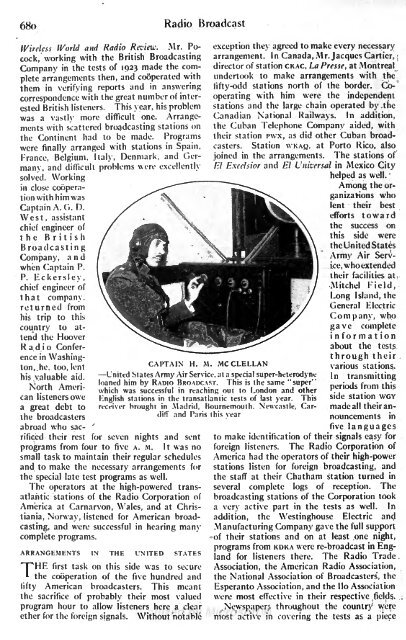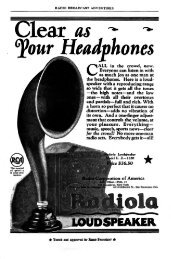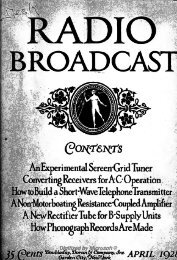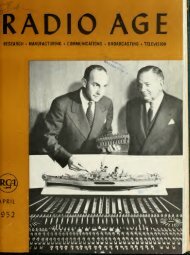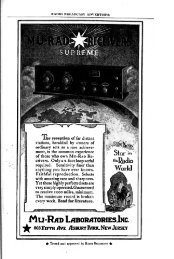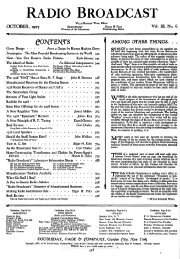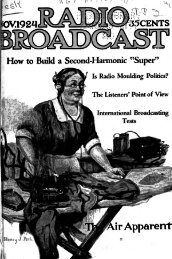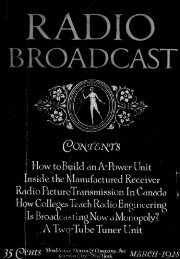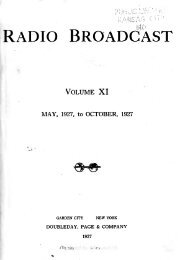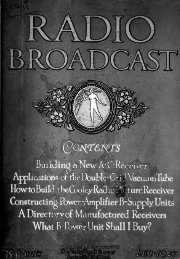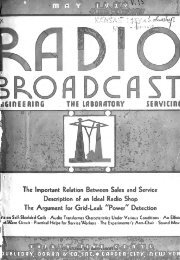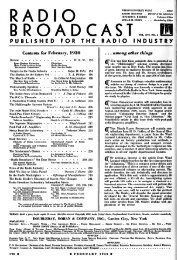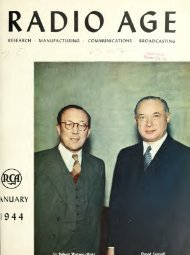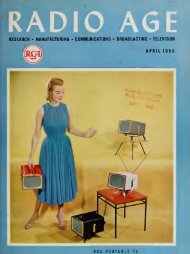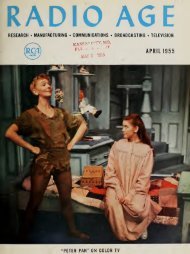Radio Broadcast - 1925, February - 113 Pages ... - VacuumTubeEra
Radio Broadcast - 1925, February - 113 Pages ... - VacuumTubeEra
Radio Broadcast - 1925, February - 113 Pages ... - VacuumTubeEra
Create successful ePaper yourself
Turn your PDF publications into a flip-book with our unique Google optimized e-Paper software.
68o <strong>Radio</strong> <strong>Broadcast</strong><br />
Wireless World and <strong>Radio</strong> Review. Mr. Pocock,<br />
working with the British <strong>Broadcast</strong>ing<br />
Company in the tests of 1923 made the complete<br />
arrangements then, and cooperated with<br />
them in verifying reports and in answering<br />
correspondence with the great number of interested<br />
British listeners. This year, his problem<br />
was a vastly more difficult one. Arrangements<br />
with scattered broadcasting stations on<br />
the Continent had to be made. Programs<br />
were finally arranged with stations in Spain,<br />
France, Belgium, Italy, Denmark, and Germany,<br />
and difficult problems were excellently<br />
solved. Working<br />
in close cooperation<br />
with him was<br />
Captain A. G. D.<br />
West, assistant<br />
chief engineer of<br />
the British<br />
<strong>Broadcast</strong>in g<br />
Company, and<br />
when Captain P.<br />
P. Eckersley,<br />
chief engineer of<br />
that .company,<br />
returned from<br />
his trip to this<br />
country to attend<br />
the Hoover<br />
<strong>Radio</strong> Conference<br />
in Washington,,<br />
he, too, lent<br />
his valuable aid.<br />
North American<br />
listeners owe<br />
a great debt to<br />
the broadcasters<br />
abroad who sac-<br />
'<br />
rificed their rest for seven nights and sent<br />
programs from four to five A. M. It was no<br />
small task to maintain their regular schedules<br />
and to make the necessary arrangements for<br />
the special late test programs as well.<br />
The operators at the high-powered transatlantic<br />
stations of the <strong>Radio</strong> Corporation of<br />
America at Carnarvon, Wales, and at Christiania,<br />
Norway, listened for American broadcasting,<br />
and were successful in hearing many<br />
complete programs.<br />
ARRANGEMENTS IN THE UNITED STATES<br />
THE<br />
first task on this side was to secure<br />
the cooperation of the five hundred and<br />
fifty American broadcasters. This meant<br />
the sacrifice of probably their most valued<br />
program hour to allow listeners here a clear<br />
ether for the foreign signals. Without notable<br />
CAPTAIN H. M. MCCLEI.LAN<br />
exception they agreed to make every necessary<br />
arrangement. In Canada, Mr. Jacques Cartier.<br />
director of station CKAC, La Presse, at Montreal<br />
undertook to make arrangements with the<br />
fifty-odd stations north of the border. Cooperating<br />
with him were the independent<br />
stations and the large chain operated by the<br />
Canadian National Railways. In addition,<br />
the Cuban Telephone Company aided, with<br />
their station p\vx, as did other Cuban broadcasters.<br />
Station \YKAO.. at Porto Rico, also<br />
joined in the arrangements. The stations of<br />
El Excelsior and El L'nk-crsal in Mexico City<br />
helped as well.<br />
United States Army Air Service, at a special super-heterodyne<br />
loaned him by RADIO BROADCAST. This is the same "super"<br />
which was successful in reaching out to London and other<br />
English stations in the transatlantic tests of last year. This<br />
receiver brought in Madrid, Bournemouth, Newcastle, Cardiff<br />
and Paris this vear<br />
toward<br />
efforts<br />
the success on<br />
this side were<br />
Among the or-<br />
who<br />
ganizations<br />
lent their best<br />
the United States<br />
Army Air Service,<br />
who extended<br />
their facilities at<br />
Mitchel Field,<br />
Long Island, the<br />
General Flee trie<br />
Company, who<br />
gave complete<br />
informal ion<br />
about the tests<br />
through their<br />
various stations.<br />
In transmitting<br />
periods from this<br />
side station WGY<br />
made all their announcements<br />
in<br />
five languages<br />
to make identification of their signals easy for<br />
foreign listeners. The <strong>Radio</strong> Corporation of<br />
America had the operators of their high-power<br />
stations listen for foreign broadcasting, and<br />
the staff at their Chatham station turned in<br />
several complete logs of reception. The<br />
broadcasting stations of the Corporation took<br />
a very active part in the tests as well. In<br />
addition, the Westinghouse Electric and<br />
Manufacturing Company gave the full support<br />
-of their stations and on at least one night,<br />
programs from KDKA were re-broadcast in England<br />
for listeners there. The <strong>Radio</strong> Trade<br />
Association, the American <strong>Radio</strong> Association,<br />
the National Association of <strong>Broadcast</strong>ers', the<br />
Esperanto Association, and the Ilo Association<br />
were most effective in their respective fields.<br />
Newspapers throughout the country were<br />
most active in covering the tests as a piece


